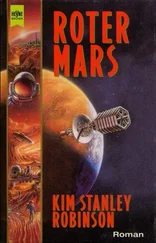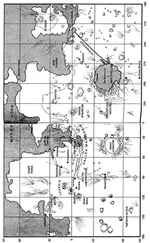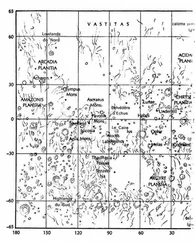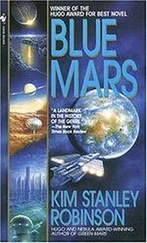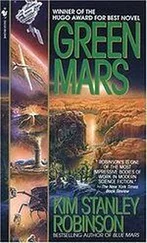“Fine for you,” Nadia said. “Or for any individual. But for the group, for all the living things here— the genetic damage, you know. Over time it would cripple us. So, you know, you can’t just think of yourself.”
“Part of a team,” Ann said dully.
“Well, you are.”
“I know.” She sighed. “We’ll all say that. We’ll all go on and make the place safe. Roads, cities. New sky, new soil. Until it’s all some kind of Siberia or Northwest Territories, and Mars will be gone and we’ll be here, and we’ll wonder why we feel so empty. Why when we look at the land we can never see anything but our own faces.”
On the sixty-second day of their expedition they saw plumes of smoke over the southern horizon, strands of brown, gray, white and black rising and mixing, billowing into a flat-topped mushroom cloud that wisped off to the east. “Home again home again,” Phyllis said cheerily.
Their tracks from the trip out, half-filled by dust, led them back toward the smoke: through the freight-landing zone, across ground crisscrossed with treadmarks, across ground trampled to light red sand, past ditches and mounds, pits and piles, and finally to the great raw mound of the permanent habitat, a square earthen redoubt now topped by a silvery network of magnesium beams. That sight piqued Nadia’s interest, but as they rolled on in she could not help noticing the litter of frames, crates, tractors, cranes, spare-part dumps, garbage dumps, windmills, solar panels, water towers, concrete roads leading east, west and south, air miners, the low buildings of the alchemists’ quarter, their smokestacks emitting the plumes they had seen; the stacks of glass, the round cones of gray gravel, the big mounds of raw regolith next to the cement factory, the small mounds of regolith scattered everywhere else. It had the disordered, functional, ugly look of Chelyabinsk-65 or any of the rest of the other Stalinist heavy-industry cities in the Urals, or the oil camps of Yakut. They rolled through a good five kilometers of this devastation, and as they did Nadia did not dare to look at Ann, who sat silently beside her, emanating disgust and loathing. Nadia too was shocked, and surprised at the change in herself; this had all seemed perfectly normal before the trip, indeed had pleased her very much. Now she was slightly nauseated, and afraid Ann might do something violent, especially if Phyllis said anything more. But Phyllis kept her mouth shut, and they rolled into the tractor lot outside the northern garage and stopped. The expedition was over.
One by one they plugged the rovers into the wall of the garage and crawled through the doors. Familiar faces crowded around, Maya and Frank and Michel and Sax and John and Ursula and Spencer and Hiroko and all the rest, like brothers and sisters really, but so many of them that Nadia was overwhelmed, she shriveled like a touched anemone, and had trouble talking. She wanted to grasp something she could feel escaping her, she looked around for Ann and Simon, but they were trapped by another group and seemed stunned, Ann stoical, a mask of herself.
Phyllis told their story for them. “It was nice, really spectacular, the sun shone all the time, and the ice is really there, we’ve got access to a lot of water, it’s like the Arctic when you’re up on that polar cap. . ”
“Did you find any phosphorus?” Hiroko asked. Wonderful to see Hiroko’s face, worried about the shortage of phosphorus for her plants. Ann told her that she had found drifts of sulphates in the light material around the craters in Acidalia, so they went off together to look at the samples. Nadia followed the others down the concrete-walled underground passageway to the permanent habitat, thinking about a real shower and fresh vegetables, half-listening to Maya give her the latest news. She was home.
• • •
Back to work; and as before, it was unrelenting and many-faceted, an endless list of things to do, and never enough time, because even though some tasks took much less human time than Nadia had expected, being robot-adequate, everything else took much more. And none of it gave her the same joy as building the barrel-vault chambers had, even if it was interesting in the technical sense.
If they wanted the central square under the dome to be of any use, they had to lay a foundation that from bottom to top was composed of gravel, concrete, gravel, fiberglass, regolith, and finally treated soil. The dome itself would be made of double panes of thick treated glass, to hold the pressure and to cut down on UV rays, and a certain percentage of cosmic radiation. When all of it was done, they would have a central garden atrium of 10,000 square meters, really quite an elegant and satisfying plan. But as Nadia worked on the various aspects of the structure she found her mind wandering, her stomach tense. Maya and Frank were no longer speaking to one another in their official capacities, which indicated that their private relationship was going poorly indeed; and Frank did not seem to want to talk to John either, which was a shame. The broken affair between Sasha and Yeli had turned into a kind of civil war between their friends, and Hiroko’s band, Iwao and Paul and Ellen and Rya and Gene and Evgenia and the rest, perhaps in reaction to all this, spent every day out in the atrium or in the greenhouses, living together out there, more withdrawn than ever. Vlad and Ursula and the rest of the medical team were absorbed in research almost to the exclusion of clinical work with the colonists, which made Frank furious, and the genetic engineers spent all their time out in the converted trailer park, in the labs.
And yet Michel was behaving as if nothing were abnormal, as if he were not the psychological officer for the colony. He spent a lot of time watching French TV. When Nadia asked him about Frank and John, he only looked blankly at her.
They had been on Mars for 420 days, and the first seconds of their universe were past. They no longer gathered to plot the next days’ work, or discuss what they were doing. “Too busy,” people said to Nadia when she asked. “Well, it’s too involved to describe, you know, it’d put you to sleep. It does me.” And so on.
And then at odd moments she would see in her mind’s eye the black dunes, the white ice, the silhouetted figures against a sunset sky. She would shiver and come to with a sigh. Ann had already arranged another trip and was gone, this time south to the northernmost arms of great Valles Marineris, to see more unimaginable marvels. But Nadia was needed at base camp, whether she wanted to be out with Ann in the canyons or not. Maya complained about how much Ann was away. “It’s clear she and Simon have started something and are just out there having a honeymoon while we slave away in here.” That was Maya’s way of looking at things, that would be what it would take to make Maya as happy as Ann sounded in her calls. But Ann was in the canyons, and that was all that was needed to make her sound that way. If she and Simon had started something it would only be a natural extension of that, and Nadia hoped it was true, she knew that Simon loved Ann, and she had felt the presence of an immense solitude in Ann, something that needed a human contact. If only she could join them again!
But she had to work. So she worked, she bossed people around the construction sites, she stalked the building sites and snapped at her friends’ sloppy work. Her injured hand had regained some strength during the trip, so she was able to drive tractors and bulldozers again; she spent long days doing that, but it just wasn’t the same anymore.
• • •
At Ls = 208° Arkady came down to Mars for the first time. Nadia went out to the new spaceport and stood on the edge of the broad expanse of dusty cement to watch the arrival, hopping from foot to foot. The burnt sienna cement was already marked by the yellow and black stains of earlier landings. Arkady’s pod appeared in the pink sky, a white dot and then a yellow flame like an inverted gas burnoff stack. Eventually it resolved into a geodesic hemisphere with rockets and legs below, drifting down on a column of fire, and landing with unearthly delicacy right on the centerpoint dot. Arkady had been working on the descent program, apparently with good results.
Читать дальше
Конец ознакомительного отрывка
Купить книгу


